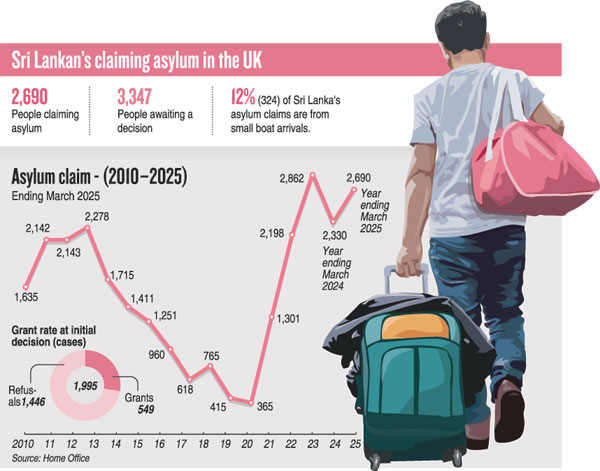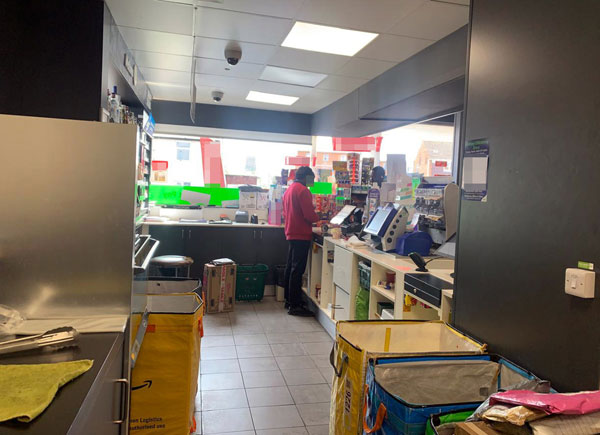News
Modern slavery: Sri Lankan migrant workers in UK exploited, students hit hardest
View(s):By S. Rubatheesan
Dreaming of a better future, Nirosh* (23) arrived in London last September to pursue his higher education in Information Technology (IT), as Sri Lanka’s 2022 economic crisis disrupted his studies and left his parents grappling with its devastating impact.
He stayed with a relative for over a week in London until he obtained admission to a college in Gloucester, some 184 kilometres from London. He says he deeply cherishes his brief stay in London.
Soon after he settled on a small house, which was turned into a student hostel where four other students also lived, he started looking for a job in his spare time to support himself and cover the expenses.

At a nearby food court restaurant, he secured a job. He agreed to the restaurant owner’s condition that he would be paid only from the second week, as the first week was for training. He was not told how much he would be paid per hour or about other benefits.
“At that time, I didn’t know about minimum wage or National Insurance. I just wanted to make some money to manage my expenses. After two weeks, he gave me 100 sterling pounds—in cash—and told me to ask if I wanted more. When I asked him later for an increase, he refused,” Nirosh told the Sunday Times.
Though students are allowed to work only twenty hours a week, Nirosh was forced to work more than forty hours a week. He quit the restaurant job and started looking for another job.
Under the UK laws, the minimum wage is set as 11.44 sterling pounds per hour for adults over 21. It is also mandatory for those who are eligible to work in the UK to obtain a National Insurance number when processing salary-related monetary transactions.
Nirosh was paid seven sterling pounds an hour at another restaurant, whereas one of his colleagues—an asylum seeker—was paid only five pounds an hour. Known as ‘cash by hand’ stores or ‘off license’ stores among students and workers who do not have work permits, these shop owners underpay their workers, and it has become a norm as well.
For example, Nirosh usually worked over thirty hours a week but received only 140 pounds in his bank account—paid at the rate of 7 pounds per hour for 20 hours, which is the legally allowed work hours for students. The owner promised to pay him the balance in cash, but the payment was irregular.
Fed up with bad working experiences and environments over a year now, he found a job at a store attached to a fuel station. He says he gets paid a decent salary now. “It is not that all bosses are bad; there are some who understand our difficulties and support us. Nobody reports these incidents because it does not serve any good to both parties.”

A Sri Lankan working in a shop in the UK
Even those who arrived on work permits also complain that business proprietors are taking advantage of them and denying them even basic workers rights.
Like Nirosh, hundreds of Sri Lankan-origin students and workers are struggling to put food on the table in a foreign land, as the UK’s stagnant economy has sharply driven up the cost of living and residential rents.
A BBC documentary series called ‘Ambulance,’ released in April, shed some insight into the life of a Sri Lankan homeless student who lived in a car park due to financial difficulties.
The student, identified as Nadeera, said he sought asylum in the UK following death threats to his uncle back home since he supported his university education. Frustrated by lack of support from UK authorities, he alleged that they were “passing the ball” regarding his asylum and welfare support. Later, the ambulance crew rescued him and ensured he received medical assistance and intervention from authorities.
Last month, a Sri Lankan work permit holder shared his difficult experiences in a Facebook group called “Sri Lankans in UK.” While seeking help to switch his visa sponsor, he claimed he was working more than 65–70 hours a week, even though his contracted hours were fixed at 35. He also stated that he was paid only half on holidays and was not entitled to unpaid leave.
T.U. Senan, a Sri Lankan-origin activist and coordinator at Tamil Solidarity, a left-leaning advocacy group in the UK, told the Sunday Times that such exploitation had become a norm in the UK, even in Sri Lankan-run businesses.
“Taking advantage of the situation the workers find themselves in, these business proprietors underpay them or extract more labour than permitted,” said Mr. Senan, who is also a member of the international secretariat of the Committee for a Workers’ International (CWI).
Exploitation of those who moved to the UK in recent years and the urgent need to find work in a foreign land to support themselves and their loved ones back home is not a new phenomenon, said a Sri Lankan-origin trader who settled in the UK in the early 2000s after securing an asylum permit on the condition of anonymity.
“Earlier, people like myself—refugees and others without proper documentation who came to this country hoping for a better future—were exploited like this. But now, even those on work permit visas are being exploited. This is modern slavery,” said the trader, who employs two Sri Lankans at his convenience store in Wembley, known as ‘Little Jaffna’ because of its large Sri Lankan community.
“I won’t do the same to my workers as my onetime bosses did to me as they took advantage of our situation back then. I don’t know where they are now. It was horrible. I’m grateful to God for what I have now,” he said.
The best way to say that you found the home of your dreams is by finding it on Hitad.lk. We have listings for apartments for sale or rent in Sri Lanka, no matter what locale you're looking for! Whether you live in Colombo, Galle, Kandy, Matara, Jaffna and more - we've got them all!

